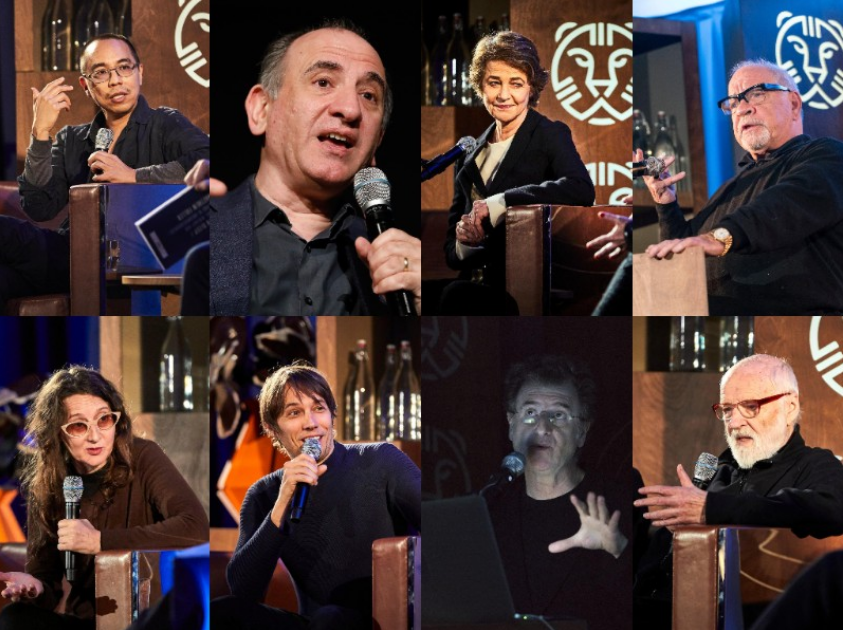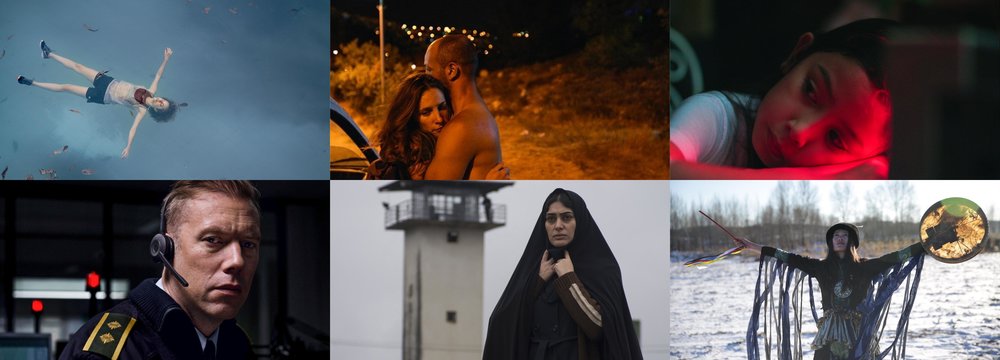This weekend, the screening of Armando Iannucci’s The Death of Stalin brought a close to the 47th edition of International Film Festival Rotterdam (IFFR). The festival initiated several innovations: the arts programme Frameworks, online streaming platform IFFR Unleashed, the two-day distribution conference Reality Check and a refocused edition of CineMart.531 feature, mid-length and short films screened this year, of which 140 world premieres. IFFR welcomed 2,405 film professionals from all corners of the world, among whom 332 filmmakers.
The festival opened on 24 January with the world premiere of Jimmie by Jesper Ganslandt. Apichatpong Weerasethakul was in Rotterdam to present his SLEEPCINEMAHOTEL, a unique project allowing visitors to sleep surrounded by moving images. And IFFR collaborated with the Rotterdam Philharmonic Orchestra to present a special screening with live performance of the score of Phantom Thread, Paul Thomas Anderson’s new film with Anderson and Vicky Krieps present. IFFR 2018 counted more than 329,000 visits, up from last year's 314,000. A grand total of 76 films received an audience rating of 4 (out of 5) or higher, busting last year’s record of 63.
Clockwise: Apichatpong Weerasethakul, Armando Iannucci, Charlotte Rampling, Paul Schrader, Jan Švankmajer, Alfredo Jaar, Sean Baker, Lucrecia Martel
This year, IFFR proudly presented an extensive Talks programme. Charlotte Rampling spoke about her role in Andrea Pallaoro’s Hannah and her impressive career; Alfredo Jaar reflected on the role of the artist in times of hunger and exploitation; Paul Schrader gave insight into his radical reworking of the film Dying of the Light as well as his new film First Reformed; Lucrecia Martel talked about her award winning Zama; Apichatpong Weerasethakul spoke about his unique artistic vision; Sean Baker elaborated on his latest indie hit The Florida Project; Armando Iannucci discussed the art of satire and Jan Švankmajer reviewed his long career in cinema, crowned by the world premiere of his latest film Insect. The Talks programme also included panel discussions on topics relating to the festival’s theme programmes. Many of the talks were streamed live on Facebook and YouTube. The total number of online views was 85,500, of which 29,000 were for Charlotte Rampling.
The festival offered five extensive theme programmes: House on Fire investigated the singular cinema coming from Tamil Nadu. PACT went deep into pan-Africanism, for example with the six-hour talk show Bridging the Gap. Curtain Call reflected on humanity’s self-defeating obsession with progress through exhibitions in LP2 and V2_. Maximum Overdrive celebrated the revival of a ’90s-inspired maximalist aesthetic and hosted the spectacular pop culture performance Totes Adorbs ♥ Hurricane. And A History of Shadows looked at the many ways in which cinema can revisit and reevaluate the past.
In the new art platform Frameworks, IFFR asked two renowned names in art to introduce two upcoming talents, the Acolytes, who each received a €10,000 grant to finish a single-screen artwork. Apichatpong Weerasethakul and Alfredo Jaar introduced Pathompon 'Mont' Tesprateep and Grada Kilomba respectively. IFFR also put a special focus on the work of Polish artist Artur Żmijewski, presented a retrospective on the films of Argentinian filmmaker José Celestino Campusano and a Deep Focus Short Profile on the work of Chinese artist and filmmaker Zhou Tao.
Festival director Bero Beyer: “It was a pleasure to see our new ventures come to fruition and to welcome so many filmmakers to the festival. Besides showcasing new films and visions, we were also reminded of the relevance of an open platform such as IFFR. Mohammad Rasoulof is still not allowed to travel freely because Iranian officials were displeased by his film A Man of Integrity, which was supported by the Hubert Bals Fund and screened at our festival this year. And a day before the screening of our closing film The Death of Stalin by Armando Iannucci, armed Russian police raided a cinema in Moscow that ignored the Kremlin’s nation-wide ban of the film.”
The diversity of award winners shows that IFFR is truly a global festival. The Hivos Tiger Award was won by Chinese filmmaker Cai Chengjie’s The Widowed Witch, which the jury praised for its “lyrical layering of cinematographic elements” and “laconic sense of humour”. The Reports on Sarah and Saleem by Palestinian filmmaker Muayad Alayan won the Special Jury Award for its screenplay and achieved the highest audience rating of all Hubert Bals Fund-supported films. Brazilian filmmaker Marina Meliande’s Sultry was also discovered early by IFFR and was supported by the Hubert Bals Fund, as was Filipino filmmaker Shireen Seno’s Nervous Translation, which won the NETPAC Award for best Asian film. Gustav Möller’s tense debut The Guilty was the overall audience favourite, and also won the IFFR Youth Jury Award. For an overview of all winners, click here.
Clockwise: Sultry, The Reports on Sarah and Saleem, Nervous Translation, The Guilty, A Man of Integrity, The Widowed Witch
With an eye on the future of independent film distribution, IFFR launched a brand new online streaming service, IFFR Unleashed, allowing year-round access to IFFR films as well as masterclasses and extras. The platform aims to support independent directors by offering them 50 percent of subscription fees as well as the final say about where and how their films are distributed. In just one week, over 1,000 users from 44 different countries have signed up. New films will be added to the IFFR Unleashed selection on a monthly basis, underlining IFFR’s commitment to helping quality films find their audiences.
IFFR presented the fourth edition of IFFR Live with six films, all by female directors and including the world premiere of Olga Chajdas’s Nina, winner of the VPRO Big Screen Award, and the international premiere of Amateurs by Gabriela Pichler. The films simultaneously screened in more than 45 cinemas worldwide. Audiences from all over the world were able to join in the post-screening talkshows. Special locations included the post-Mugabe Zimbabwean capital Harare, as well as Curaçao.
Many of the big sales agents were present at the festival. Films picked up in international sales deals include Anna’s War by Alexey Fedorchenko, Fátima by João Canijo, Djon África by João Miller Guerra and Filipa Reis and Nervous Translation by Shireen Seno. Benelux distribution deals included Gustav Möller’s The Guilty, Gustavo Pizzi’s Loveling as well as two titles also selected for the Big Screen Competition, Pity by Babis Makridis and Nina by Olga Chajdas. The Belgian film Rabot by Christina Vandekerckhove was picked up for release in the Netherlands.
IFFR 2018 hosted the first edition of Reality Check, a two-day conference focusing on film distribution. The programme was designed to lift the fog of uncertainty around current and future distribution methods and models. There were panel discussions with people from all areas of the industry.
The 35th edition of CineMart was refocused and offered a platform to 16 projects and welcomed 620 guests. By focusing on fewer projects, CineMart aims to give more in-depth and year-round support to promising projects. Seven Hubert Bals Fund-supported titles screened at this festival edition. During IFFR 2018, four projects were presented at the VR Days event and nine projects previously supported by CineMart or HBF were presented during BoostNL. 59 people participated in Rotterdam Lab, a five-day training workshop for emerging producers.
IFFR 2018’s expanded education programme was diverse and reached even more people than last year. There were special talks, screenings and workshops for young people and the IFFR Youth Jury presented a special award. More than 28,000 children and students attended our special programmes. We also organised a special workshop for teachers on how to incorporate film into the school curriculum.
IFFR welcomed a new main sponsor, vfonds, and presented two new awards: the Found Footage Award supported by the Institute for Sound and Vision and the Voices Short Audience Award. IFFR also welcomed Ammodo as its new partner for the Tiger Short Competition. Rotterdam designer Susan Bijl made a new limited edition of her famous shopping bag and Alfredo Gonzales designed special Tiger socks that were for sale at IFFR’s merchandise store.
267 feature films of which 60 world premieres, 35 international premieres and 19 European premieres.264 short and mid-length films of which 80 world premieres, 37 international premieres and 24 European premieres.
Contact details
Related news
Hubert Bals Fund and Brazilian partners Spcine, RioFilme and Projeto Paradiso launch new development support initiative
Pilot initiative will support up to nine Brazilian fiction film projects in early development.
The Displacement Film Fund spearheaded by Cate Blanchett and managed by IFFR’s Hubert Bals Fund unveils recipient fil...
The Displacement Film Fund spearheaded by Cate Blanchett and managed by IFFR’s Hubert Bals Fund unveils recipient filmmakers and projects for pilot scheme
International Film Festival Rotterdam closes 54th edition with 12% increase in visitor numbers and ticket sales, and ...
Walter Salles’ I’m Still Here wins coveted Audience Award for 2025
International Film Festival Rotterdam reveals winners of 2025 Tiger Award and Big Screen Award
Fiume o morte! and Raptures take IFFR 2025’s Top Awards
International Film Festival Rotterdam unveils 2025 Tiger Short Competition winners
Three titles receive equal Tiger Short Awards, each worth €5,000, KNF Award winner and nomination for European Short Film Award also announced






